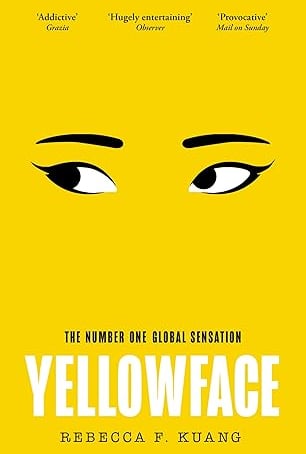Book Review: Yellowface by R.F. Kuang
This is my first book review. Not only was I being entertained, but I was also forced to reflect (as an aspiring blogger) whether I should follow a success formula (i.e. something that is already trending) or create something original.
5/28/20252 min read


What makes a bestseller? Talent? Luck? Or something far more unsettling?
R.F. Kuang’s Yellowface delivers a gripping look at the publishing industry, unraveling the complexities of ambition, ethics, and identity. At its core, the novel forces us to confront a harsh truth: In the pursuit of success, where do we draw the line between being inspired by others and outright stealing their work?
Influence vs. Theft: The Publishing Industry’s Unspoken Battle
In Yellowface, a struggling writer finds herself at a moral crossroads. Her desperation for recognition leads her to claim another author’s work as her own—justifying it as a means of survival. But when does admiration turn into plagiarism? When does learning from someone else's craft become exploitation?
The book lays bare a dilemma that extends far beyond the literary world. Every aspiring writer is shaped by the stories they read, much like entrepreneurs study successful business models. But the unsettling question remains: Is borrowing ideas an homage—or an act of theft?
A Business Parallel: Copying Success vs. Carving Your Own Path
The ethical debate in Yellowface mirrors a common struggle in entrepreneurship. Many businesses thrive by replicating proven formulas. Fast food chains follow the model pioneered by McDonald's. Tech companies refine and repackage innovations. Social media apps borrow features from competitors.
But is this just smart strategy, or is it a form of creative theft? When does following in the footsteps of success become a violation of integrity?
Entrepreneurs face the same dilemma as writers:
Do you build something original and risk failure? Or do you adapt someone else’s success and risk being labeled unoriginal?
The answer often lies in execution. Innovation isn't always about creating something entirely new—it’s about refining, improving, and adding unique value. In business, as in writing, borrowing isn’t inherently wrong. The real ethical breach occurs when someone erases the original creator and claims ownership over borrowed ideas.
Finding the Balance
Kuang’s Yellowface forces us to reflect on the ethical gray areas of success. Whether in literature or business, shortcuts can get you ahead—but they can also cost you something deeper: credibility, respect, and your own sense of integrity.
So, as we navigate the paths of writing, entrepreneurship, or any creative pursuit, the real question isn’t just about success. It’s about ownership. Are we contributing something new—or simply rewriting someone else’s achievements?
Let’s read. Reflect. Decide.